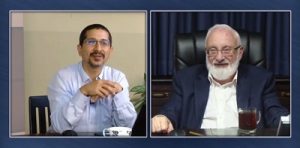New Life 256 – Good Neighboring
New Life 256 – Good Neighboring
Dr. Michael Laitman in conversation with Oren Levi and Nitzah Mazoz
How do we turn from merely tolerating our neighbors to a loving connection with them? In a certain way, our neighbors are closer to us than any other people. They affect us in our homes when we perceive their noise, music, odors, arguments, conversations, etc. When we create positive relationships with our neighbors, our homes and neighborhoods become places of safety, serenity, and tranquility, enveloped in a cloud of goodness and calm.
Dr. Laitman offers a set of practices that turns bad neighbors into good neighbors so that it becomes a pleasure to be around them. It begins with a set of five or ten meetings between neighbors, perhaps twice per week, in which we introduce the principle of “Love covers all crimes.” Rather than focus on any complaint, we leave the crimes “downstairs” while we build connection above them. Even if it is far from our actual experience, we must imagine our neighbors as ideal neighbors. When I pass their door, I bless them and only think positive thoughts about them. And so on.
Within a month or two everything will change. It will start to hurt my self-respect to think anything bad about my neighbors.
We can evaluate the shift that occurs by asking: How did my opinions about my neighbors change? How much did unpleasant thoughts about them awaken in me? How much was I able or unable to overcome these thoughts? How many transgressions are now occurring compared to what was happening before? We will find that we not only have much better relations with our neighbors, but also within our family and work relationships. Our efforts will lead to warm embraces filled with mutual love, to good feeling and contentment in our shared environment.
This summary was written and edited by students of Kabbalist Dr. Michael Laitman
[123817]
From KabTV’s “New Life 256 – Good Neighboring,” 11/18/13












